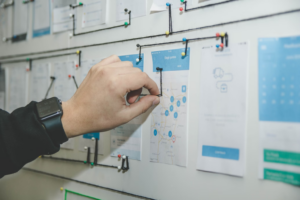Resilience at work should be defined as a person’s ability to overcome an adverse situation in their work environment or within their professional sphere in a strengthened way. However, although it is obvious that this ability exists and helps us all to move forward in life and in our profession, it is not something that we should accept in an uncritical way. Keep reading to find out how to build resilience at work.
Building resilience at work
Adverse situations, i.e., those likely to generate a high level of psychological distress, can be of many types, depending on their origins (the causes), their effects (the consequences for the employees, their environments, and the companies they work for), and, of course, their level of severity.
Some examples of these situations could be: experiencing a period of high stress due to work overload, being fired (or being fired by a colleague with whom we have a very positive bond and on whom we rely heavily for our tasks), or finding ourselves without a boss, leaving the team disorganized.
As previously mentioned, resilience at work is a person’s ability to overcome obstacles with minimal strain, be solution-oriented, track possible learning and focus more on the future than on the past.
In short, resilience at work is what makes us wiser, stronger, and more experienced employees. It can be a skill that we trigger spontaneously and quickly, or it can be something that takes shape more slowly as time goes by. Each employee is different and therefore has their own way of adapting to such situations.

Why resilience at work is not always possible
As explained so far, resilience seems like a wonderful ability that everyone would like to possess or, at least, cultivate. It would also be a virtue that will be highly appreciated by recruiters and talent retention managers in HR departments.
Indeed, it is true: those who have good resilience in general and especially good resilience at work have an asset. However, we must not let ourselves be blinded by words and definitions, forgetting that what is beautiful on paper (or on the screen) must then be transferable to real people.
All human beings have a certain capacity for resilience at work, mainly as a result of our personality, our education, and the lessons we have had as a result of our professional careers. However, resilience, as a concept does not explain everything (actually, if we look at it, it is quite vague, rather general, and abstract) and, of course, it should not be used in a manipulative or self-serving way.
How might the idea of resilience at work be distorted?
In essence, using it as an excuse to demand employees to deal with any type of obstacle, adversity, or stressor to which they are subjected in their jobs. This would lead to the employees being expected to pull out that alleged internal superpower that we all have inside us and that we have come to call resilience at work.
In other words, it is great to face the problems that arise, for example, in our day-to-day work and, in addition, to come out of them strengthened and enriched as employees (in short, as people).
However, it is not always the time for resilience, since normally – especially in very problematic situations – it is necessary for the person to have some time to recover, to reorganize, even to regret and become aware of the damage they have suffered. Then, if necessary, stop and think about what good can come out of the situation.
In fact, it is important we do not allow ourselves to be influenced by a tyrannical interpretation of the concept of resilience, in this case, resilience at work, expecting to learn or gain from any problematic event we experience in our professional careers.
An unbearable colleague with whom we have to work every day, a boss who mobs us, a continuous situation of lack of recognition or promotion opportunities, an unexpected scolding that we consider unfair and we do not know where it comes from, an undeserved dismissal that makes us lose a job that we needed or that we loved?
Many people could develop a good capacity for resilience at work during or after these experiences. However, many others would not be able to find any learning, any contribution, any personal enrichment that could compensate for the burnout, stress, frustration, or helplessness that are often associated with this and other types of adverse situations at work. This is perfectly natural, it doesn’t mean that they are less intelligent, more depressed, more fragile, or worse employees. We’re just human beings.
Sometimes we come out of situations better, wiser, and more knowledgeable. There are even times when we are grateful that certain things happen to us in our day-to-day work (because those small difficulties are what shape our skills) or very negative events in a timely manner (because they teach us lessons that we have been fortunate enough to apply).
However, there are also times when there is simply nothing to learn and nothing to be grateful for in certain negative experiences that we have the misfortune to experience in our work environment. In short, there are times when, quite simply, resilience at work has little or no room to emerge.

Join the global leading solution in mental well-being
It’s not just resilience
What was discussed in the previous section can happen when we give prominence to just one of the qualities that help us daily. The truth is that in today’s world of work, resilience is not the only quality we need to develop to be successful. Others, such as emotional intelligence, are key to professional success and building healthy relationships at work.
This skill involves not only the knowledge and management of one’s own emotions but also the ability to understand and respond to the emotions of others. Therefore, if resilience is the capacity we have to overcome obstacles, orienting ourselves to seek solutions, emotional intelligence plays a fundamental role, as it will help us deal with our emotions in the best possible way, in order to emerge stronger in the face of adversity.
And all this, of course, is made easier if there is an optimal working environment, which allows employees to accept their mistakes and learn from them. This is how a third construct comes into play: psychological security at work. This concept then represents a key component in fostering resilience, as it fosters an environment where employees feel free to express ideas, make mistakes without fear of retaliation, learn from them, and collaborate effectively when one of the team members needs support.
In this way, these two aspects, emotional intelligence and psychological safety, complement resilience at work, cultivating a work environment that promotes the holistic well-being of employees. To visualise this better, we could summarise the above concepts as the following:
| Concept | Description |
| Emotional Intelligence | Ability to recognise, understand and manage one’s own emotions and those of others and respond empathetically to them. |
| Psychological Security | An environment that fosters trust, openness, and tolerance, allowing employees to express themselves without fear of repercussions. |
| Resilience | A person’s ability to overcome obstacles with a minimum degree of burnout, be solution-oriented, track possible learning, and focus on the future rather than the past. |
Additionally, within the labour context, companies that provide well-being training are pioneers, offering a strategic tool for companies committed to human development and labour efficiency. Therefore, training employees in emotional skills, promoting psychological safety, and providing resources to manage stress are key investments that positively impact employees’ mental well-being, productivity, and job satisfaction.
In line with this perspective, the projected trends for HR departments in 2024 underline the growing importance of well-being as one of the main focus areas.
This is because evolving work practices have shown that environments that prioritise employees’ emotional and psychological health contribute to individual employee success and empower the organisation. This is how employees’ mental well-being is positioned as one of the solid foundations in the future world of work, being the key element for performance and innovation.
Emotional well-being program for companies
At ifeel, we know that work should not disrupt people’s well-being. That is why our team of psychologists, experts in well-being at work, has created an emotional well-being program for companies that improves talent retention, reduces absenteeism, and combats employee stress.
In our Resources section, you will find useful material, such as podcasts, HR guides, or interviews with HR managers. In addition, we have a Psychosocial Risk Factors Template, which you can use to comply with the requirements of the Labor Inspection.
Thanks to our emotional well-being program, your company’s HR managers can receive personalized, data-driven advice on how to improve the psychological well-being of their teams. In addition, this program offers employees a 360° mental health care service structured at different levels according to their needs. Try our program today to see how it could help you.
We hope you found this post about resilience at work interesting. If you would like more information about our emotional well-being program for companies, simply request it and we will contact your team as soon as possible.









